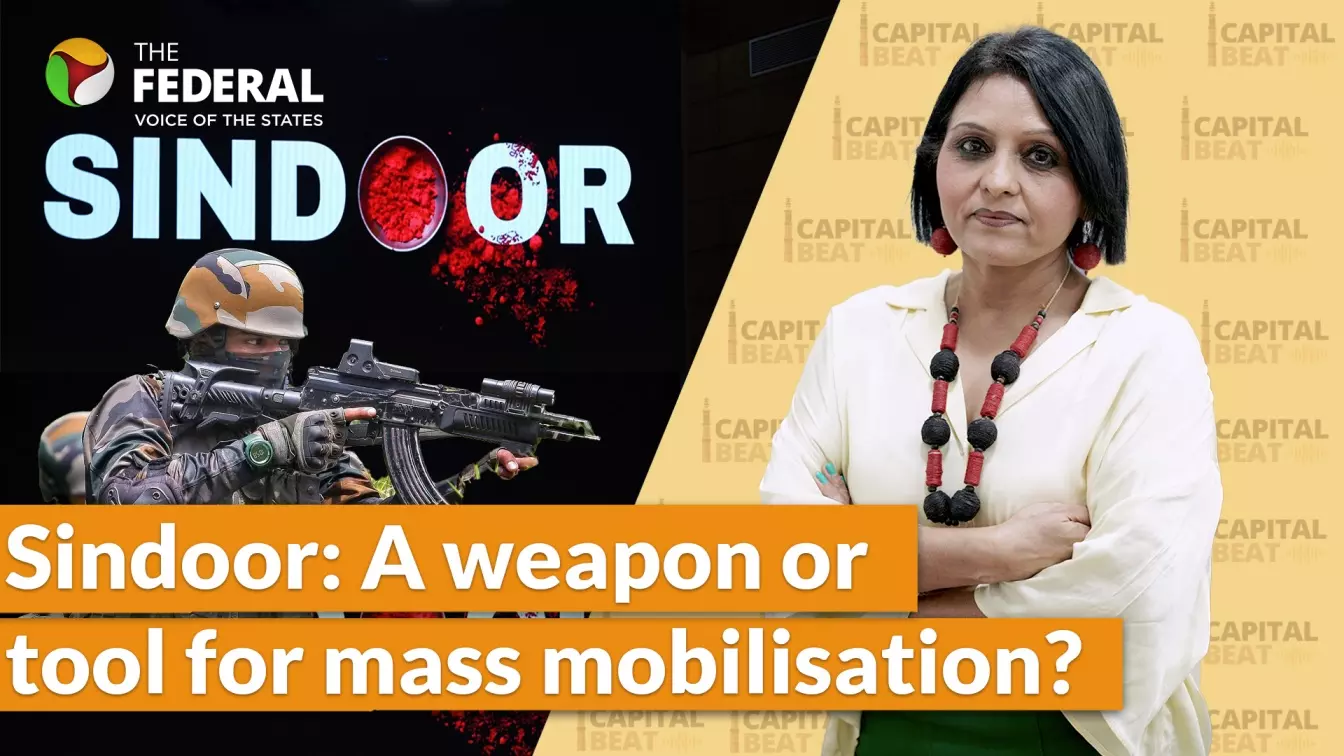
The Sindoor debate: Women’s empowerment or religious nationalism?
PM Modi links Operation Sindoor to women power and tradition, invoking Hanuman and Shakti Puja. Is BJP crafting a new wave of religious nationalism?

In this episode of Capital Beat, BJP leader Sanjeev Pancholi, journalist Kumudini Pati, and independent media analyst Siddharth Sharma join the debate on the symbolism and politicization of sindoor following Prime Minister Narendra Modi’s repeated references to it in the aftermath of Operation Sindoor.
With BJP supporters launching Ghar Ghar Sindoor campaigns and Modi invoking cultural traditions to link sindoor with valour and women’s empowerment, the panel discusses whether this is a genuine cultural expression or an attempt to mobilize voters, particularly women, in upcoming elections.
Operation Sindoor and symbolism
Prime Minister Modi described Operation Sindoor as the most successful anti-terror campaign in Indian history during his address in Bhopal commemorating Ahilyabai Holkar's 300th birth anniversary. He tied the operation to the cultural significance of sindoor, citing figures like Hanuman and linking it with bravery and women's power.
BJP leader Sanjeev Pancholi defended the party’s embrace of sindoor as a symbol of national pride and denied that the campaign was orchestrated by the party, instead calling it a people's movement supported by the BJP.
However, questions were raised by the host about the optics of cut-outs, roadshows, and the spectacle surrounding Modi’s image. Pancholi responded that these were spontaneous expressions of public support and cultural reverence.
Also read: CDS Chauhan outlines India’s strategy and wins in Op Sindoor: 10 points
Cultural appropriation or strategic narrative?
Kumudini Pati critiqued the appropriation of sindoor for political gain, arguing that the symbol is deeply private and only relevant to a section of Hindu married women. "Not all women wear sindoor, and certainly not women from every religion," she pointed out, questioning its projection as a national symbol.
She further criticized Modi's statement that terrorists had challenged women power, calling it a deflection from the real issue: a failure of the security apparatus in Pahalgam.
Pati also highlighted the disconnect between political rhetoric and real women's empowerment, citing low female labour participation, literacy rates, and high anaemia prevalence in India. She noted that if women's empowerment were truly the goal, the Prime Minister should have directly engaged with the families of soldiers lost in the operation.
Also read: ‘Jet being downed not important, but why’: CDS on Op Sindoor losses
Sindoor as a campaign tool?
Siddharth Sharma took a more satirical approach, questioning why the BJP was distancing itself from a Ghar Ghar Sindoor campaign if the Prime Minister had made sindoor a national talking point.
"Why are NGOs distributing sindoor? If this is so central to Indian culture, BJP should proudly take it door to door like vaccines," he remarked.
Sharma noted that Modi has delinked Operation Sindoor from cultural references and focused on sindoor as a standalone symbol, which only further complicates the public understanding. "It was a private cultural object. Now, it is part of political spectacle," he said.
Contesting women’s voices
Adding a ground-level perspective, Pati cited feedback from women in Bihar, who viewed sindoor as an intimate part of their marriage, not something to be handed out by political parties.
"This is between me and my husband," many women told her. The discomfort at political workers distributing sindoor was seen as intrusive.
Responding to this, Pancholi insisted that sindoor was not private property but a divine symbol of feminine power and married life. He confirmed that the BJP may resume the Ghar Ghar Sindoor campaign, stating, "It will happen when the time is right."
Also read: Op Sindoor most successful anti-terror strike in history of India: Modi
Political messaging and electoral math
When asked whether the sindoor push was a strategy to court women voters in poll-bound states like Bihar and West Bengal, Pancholi acknowledged that every political party strategizes for elections.
"Everything is fair in love and war," he said. Sharma and Pati saw this as a clear admission that religious symbolism was being used for electoral advantage.
Pancholi, however, reiterated that this was not celebration but a moment of pride for Indian citizens. "Sindoor has become its own brand," he claimed, emphasizing its cultural and emotional resonance.
The panel agreed that the issue transcends cultural debate and enters the domain of politicization. With BJP leveraging sindoor as a narrative device post-Operation Sindoor, the conversation reflects deeper questions about symbolic nationalism, women’s agency, and the limits of electoral mobilization.
The content above has been generated using a fine-tuned AI model. To ensure accuracy, quality, and editorial integrity, we employ a Human-In-The-Loop (HITL) process. While AI assists in creating the initial draft, our experienced editorial team carefully reviews, edits, and refines the content before publication. At The Federal, we combine the efficiency of AI with the expertise of human editors to deliver reliable and insightful journalism.

